Travelling Knowledges


Travelling Knowledges
International Student Mobility Program @ UNBC
Come to Our Next Student Information Session:
January 22nd, 2024
12:00pm Vancouver
Join Zoom Meeting
Meeting ID: 674 7273 6099
Passcode: 570401
Application Deadlines
September 1, 2023 for students travelling for internships or independent study between October 1, 2023 to March 31, 2024
and
April 1, 2024 for students travelling for internships or independent study between May 1, 2024 to March 31, 2025.
Applications should be emailed to travelling.knowledges@unbc.ca with “Travelling Knowledges Application – [Your Name]” as the title


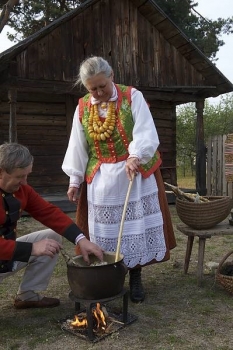
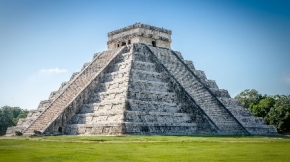
It is our firm belief that UNBC students who participate in the Travelling Knowledges program will return home with newfound confidence, expertise, and determination to implement and share their acquired knowledge and experience.
The Travelling Knowledges Program
Funding for UNBC Student Educational Travel
"Travelling Knowledges: Local Cultures and Environments Across Geographies" permits UNBC students in any discipline to exchange knowledge on diverse issues. You can explore topics including, but not limited to, cultural safeguarding, sustainability, economic development, human rights, and socio-environmental challenges. You can study language and culture in another country. This program allows students to experience travel abroad, live in another community, participate in cultural and linguistic revitalization, or learn about Indigenous and/or local community issues all while obtaining UNBC credit through a field school, exchange, or individual travel!
The objective of the program is to help students bring their newfound knowledge and experience back to Canada and their communities. Students can apply to obtain funds for travel to countries such as New Zealand, Mexico, Poland, India, and South Africa, where we have existing partnerships, or to practically any country in the world that offers a meaningful educational opportunity. A Project Team will assist with emotional and academic needs to ensure that UNBC students gain inter-cultural, leadership, and work skills in a supportive environment.
The Travelling Knowledges program is funded by the Government of Canada & UNBC as part of the Global Skills Opportunity. The Global Skills Opportunity (GSO) places emphasis on the need for skills like problem-solving, communication, digital literacy, creativity, and perseverance to adapt to changes in the workplace. By building on strong international networks and partnerships, the GSO equips the next generation of Canadians with in-demand workplace and inter-cultural skills and international experience.

Why apply for the Travelling Knowledges program?
This project offers UNBC students in diverse disciplines an opportunity to experience travel abroad by engaging in another culture language, or academic life. You can also complete internships and join a field school – all while obtaining UNBC credit! The Travelling Knowledges Program is a great opportunity to enhance student academic experience by engaging in experiential learning relating to sustainability, culture, development, local and Indigenous community issues. You will also gain valuable work and cultural skills that will enrich your scholarship and future career.
*New: Travelling Knowledges I and TKII Knowledge that Moves
There are key distinctions between the two programs, however—please review the key features below to find the program that is right for you!
Contact the program leads (Dr. Holler & Dr. Pawlowska-Mainville) for more information:
jacqueline.holler@unbc.ca – agnes.pawlowska-mainville@unbc.ca

Travelling Knowledges I
- Funder: Global Skills Opportunity Canada
- Duration: January 2022-March 2025
- Next Application Date: 1 April 2024 (for students travelling for internships, exchanges, or independent study from 1 May 2024 to 31 March 2025)
- Eligible:
- Canadian Citizens and landed immigrants
- Undergraduate students only (>30 credits completed)
- Duration of Stay: 30-180+ days
- Funding Available: Dependent on stay; extra funding for "target" students (low-income, Indigenous, living with disability)
- Eligible Countries: any country not currently under RED Government of Canada travel advisory
- Application information is below

Travelling Knowledges II: Knowledge that Moves
- Funder: Rideau Hall Foundation/QE2 Scholars Program
- Duration: January 2024-December 2027
- Next Application Date: 1 May 2024 (for students travelling for internships, exchanges, or independent studies from 1 May 2024 to 31 April 2025)
- Eligible
- Canadian citizens and landed immigrants under 35
- Upper-level undergraduate students (>60 credits complete) and graduate students
- Duration of Stay: 60-180+ days
- Funding Availability: Dependent on stay
- Eligible Countries: Select from a list of 138 countries, mainly in the Global South (Annex B, p. 16)
- How do I apply? Keep your eyes peeled for the new WebPage for this program!
Eligibility
- Any and all domestic undergraduate students are eligible to apply. Students must be in good academic standing to obtain funding.
- Domestic undergraduate UNBC students in any discipline can travel to another country for a period of 3 weeks to 1 year for UNBC course credit.
- Undergraduate Indigenous and low-income students and students with disabilities are eligible for additional supports
Funding and Expenses
The following levels of funding are available to applicants, in any discipline, who are accepted into the program:
Individual travel (immersion, UNBC exchange, internship, independent study)
- Travel for SHORT-immersion period (25-28 days): $ 4000 (3 UNBC credits)
- Travel for SHORT internship period (30-40 days): $ 5000 (3-6 UNBC credits)
- Travel for MEDIUM period (45-60 days): students receive $6000 (3-9 credits)
- Travel for LONG period (70+ days): students receive $7000 (9+ credits)
Field Schools
- Students are eligible for $6000 in funding for UNBC field schools such as Guatemala (planned for 2023) and/or Isle of Man & Ireland (tentative for 2024). The Travelling Knowledges program plans new field schools to Poland (2024) and/or New Zealand (2025).
- Please note that students planning to attend UNBC field schools must meet the requirements established by field school organizers before being admitted to the field school in question.
How do I apply?
Information sessions on the project are held two times per each academic year, but visit our website regularly for updates and upcoming deadlines.
Application Package
The application package should consist of:
- Letter of intent (1-2 pages)
- Please ensure your full name, UNBC student number, UNBC e-mail, and contact information are included at the top of your letter.
- Please ensure that you specify in the first sentence of your letter the program you are applying for (either TKI or QES/TKII), your destination country, and the duration of your proposed stay.
- Tell us why you are a good candidate for this funding and what you hope to achieve through your time abroad.
- Describe one of the following, as appropriate to your travel plans:
- For internship, research. or other form of individual academic travel: Your area of interest, potential countries, organizations, communities, or the university/faculty/department that can best fulfill your needs; the UNBC credit you will earn; and the UNBC professor who will supervise your experience (please enclose a letter from this professor as proof of UNBC credit to be earned)
- For formal UNBC exchange: The university you plan to attend and your educational plans while there. Note that you must apply separately for the formal exchange and must meet all requirements set by UNBC. See your advisor early to get started!
- For a UNBC field school: The field school you wish to attend and how it relates to your educational goals and interests.
- Describe what you hope to bring to the organization/community/department abroad and what role you see for yourself.
- For Travelling Knowledges I only: If applicable, tell us whether you are an Indigenous student, a student coming from a low-income family, or a student with a disability, and explain any additional expenses or needed supports requiring extra funding.
- Timeline (1 page)
- Tell us when you hope to travel (dates) and for how long.
- Proposed Budget (1 page)
- Outline foreseeable expenses and list your available funds.
- Letter of Reference
- Please include a letter of reference from a faculty member. The letter should explain not only your academic competence, but also your suitability for the international experience you seek.
- Transcript
- Please include a printout of your recent (unofficial) transcript (from the past 6 months).
Applications should be e-mailed to travelling.knowledges@unbc.ca with the subject: Travelling Knowledges Program Application – [Your Name]
Travelling Knowledges Alumni and Testimonials

Jessica Froese
UNBC Geography major Jessica Froese travelled to Norway for an internship with the Norwegian Institute for Nature Research (NINA) in July-August 2022. She says:
I had the opportunity to travel to Norway through the Travelling Knowledges program in the last summer before I graduate, and it was unforgettable. Not only did I receive 6 credits, which allowed me to take two fewer classes during my last year of school, but I got to immerse myself in a foreign culture while doing it. As a Human Geography major who has been learning in a classroom for three years, this program felt completely necessary. My trip was a great blend of adventure and academics; I saw beautiful sights, met wonderful people, and learned things about myself that I may never have otherwise had the opportunity to.
Julie Forrest
Julie is studying at Ájtte, a Sámi museum and cultural center, in Northern Sweden as part of the Travelling Knowledges program. She is working on an independent study (GEOG 499) supervised by UNBC professor Dr. Tristan Pearce, looking into the northward expansion of ‘green energy’ (windfarms, mining) on Sámi lands. She is also assisting the research unit at Ájtte in their search for collaborative planning tools for land use conflicts between Sámi reindeer herders and mining activity in the region.
When not studying, Julie is exploring the wonders of life above the Arctic circle.
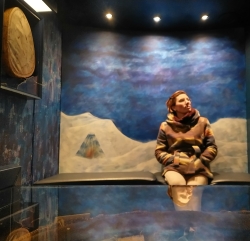
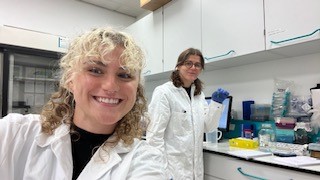
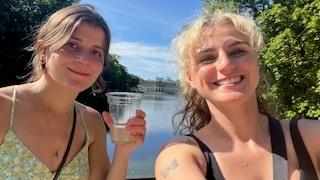
Aspen Vassallo and Alexia Bankowski
Alexia and I are one month in to working in the lab here in Warsaw and have one month left to go, so half way! We are fitting in really well and getting along great with our supervisor, the PhD student we are working under, Francesca. We have done lots of exploring around the city and Alexia has spent lots of time with her family!
Nicole Boyd
Coming to Australia has been an interesting and amazing experience. I am able to see the country, interact with different animals and meet wonderful people while achieving my academic goals. It is worth the journey, and I highly recommend people to pursue the experience to travel abroad.
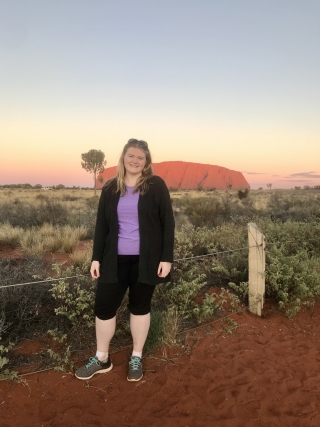
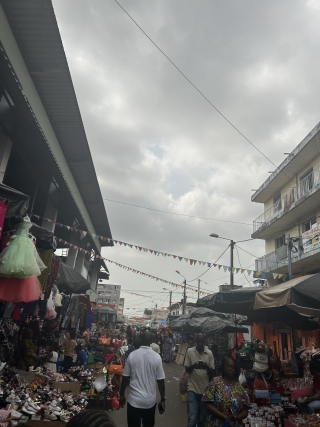
Aboubacar Cisse
The experience has been incredibly enriching, and I have learned not only about animals and farming but also gained valuable insights into various aspects of animal husbandry. This journey and this experience has sparked an eagerness in me to explore more opportunities in this field.
Applications should be e-mailed to travelling.knowledge@unbc.ca with the subject: Travelling Knowledges Program Application – [Your Name]
For more information, about the Travelling Knowledges Program, please contact the Program Directors:
Dr. Agnieszka Pawlowska-Mainville: agnes.pawlowska-mainville@unbc.ca
Dr. Jacqueline Holler: jacqueline.holler@unbc.ca

Photos, t-B, L-R: Tree-beekeepers in Poland. Source: UNESCO.com; India. Source: USnews.com; Norway. Source : Dailyscandinavian.com; Aotearoa; A. Africa: worldnomads.com
